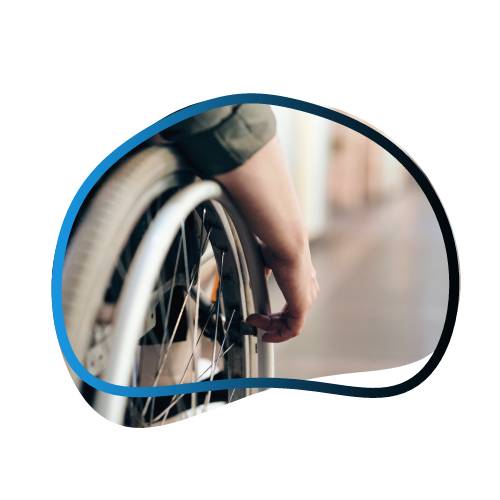NEUROLOGICAL CONDITIONS

NEUROLOGICAL CONDITIONS
Neurological physiotherapy is the treatment of patients who have a neurological disorder. Neurological disorders are those affecting the brain, spinal cord and nerves; such as stroke, MS and Parkinson’s disease. Treatment in neurological conditions is typically based upon exercises to restore motor function through attempting to overcome motor deficits and improve motor patterns. At Impact Clinic, our physiotherapist dedicated to working with you to help you achieve your individual goals.
Stroke Rehabilitation
Physiotherapy is an integral component of your road to recovery from a Stroke. Stroke known as a cerebrovascular accident is a result of lack of oxygen to the brain due to a clot causing decreased blood flow, or ruptured vessel in the brain. Physiotherapy applied early in the patient journey will improve, function, health, and independence.
For most stroke patients, rehabilitation mainly involves physiotherapy. The aim of physiotherapy is to have the stroke patient relearn simple motor activities such as walking, sitting, standing, lying down, and the process of switching from one type of movement to another.
Another type of therapy to help patients relearn daily activities is occupational therapy. This type of therapy also involves exercise and training. Speech therapy helps stroke patients relearn language and speaking skills, or learn other forms of communication. Learn more about stroke signs, treatment, and prevention at Impact Clinic.
Diabetic Neuropathy
Diabetic neuropathy is a type of nerve damage that can occur if a person is suffering from diabetes. Diabetic neuropathy most often damages nerves in your legs and feet. Depending on the affected nerves, diabetic neuropathy symptoms can range from pain and numbness in your legs and feet to problems with your digestive system, urinary tract, blood vessels, and heart.
Physiotherapy treatment may help reduce dependency on pain relieving drug therapies. Certain physiotherapy techniques can help alleviate symptoms brought on from diabetic neuropathy such as deep pain in the feet and legs, tingling or burning sensation in extremities, muscle cramps, muscle weakness, sexual dysfunction, and diabetic foot.
Parkinson’s disease
Parkinson’s usually affects people over 60 years of age, but there have been found exceptions to this and some people have been diagnosed at the age of 40 and even younger. Parkinson’s disease is basically a neurodegenerative disorder that affects the dopaminergic neurons in the substantia nigra area of the brain, which is essentially responsible for dopamine production. Dopamine is the chemical that is responsible for carrying messages around the brain
Physiotherapy for Parkinson’s disease forms a very important component in Parkinson’s treatment. The main idea behind offering physiotherapy to Parkinson’s patients is to address the issues of mobility, flexibility, posture and balance. Physiotherapy offers great help in the maintenance of patient’s mobility and balance, thereby offering functional independence to them. Physiotherapy exercises also help to mobilize stiff joints and provide flexibility to tight muscles.
Facial Palsy
Facial/Bell’s Palsy can occur when the nerve that controls the facial muscles becomes inflamed, swollen, or compressed. Physiotherapy for facial paralysis is the key treatment option for this condition. Although Bell’s Palsy can happen at any age, the condition is more common among people between ages of 16 and 60.
Physiotherapy for facial palsy works on the patient’s muscles of the face, eyes, nose, lips, and other facial parts to promote facial movements effectively. And, the best part is that they can be performed within the comfort and privacy of your home. A comprehensive facial palsy physiotherapy treatment plan gives you the freedom to perform the exercises within the safety, privacy & comfort of your home.
Spinal Cord Injury
A spinal cord injury is damage to the spinal cord, which carry signals to and from the brain. A person with damage to the spinal cord may suffer from loss of sensation and motor function depending on the level and severity of injury. Most injuries to the spinal cord are incomplete and do not sever the spinal cord. Some injuries will allow almost complete recovery. Others will result in complete paralysis
Physiotherapy for a person with an injured spinal cord should start as soon as possible after injury. People who have suffered from a spinal cord injury benefit from specialist neurological physiotherapy. A spinal cord injury will have a life changing impact on you and those close to you. Our specialist neurological physiotherapists at Impact Clinic understand that a person with damage to their spinal cord with face considerable challenges throughout their life. Physiotherapy treatment will support and guide you through your treatment working closely with your partners, family and carers.
Guillain-Barre Syndrome (GBS)
Guillain-Barre Syndrome (GBS) is a rare condition in which the immune system attacks part of the nervous system. GBS affects the peripheral nerves and causes weakness and loss of sensation. Most commonly, GBS is developed following a viral or bacterial infection, which is thought to trigger an immune response that attacks the nerves. GBS often resolves relatively quickly, however the weakness and loss of sensation can take some time to resolve.
As each individual responds differently to the condition, our specialised physiotherapists aim to individualise treatment to help restore movement and function.
Multiple sclerosis or MS
Multiple sclerosis or MS is caused by damage to the nerve fibres in the central nervous system (brain and spinal cord) affecting movement, cognition and behaviour. MS is also termed an autoimmune disorder as the immune system attacks the myelin (protective sheath) that surround the nerve fibres disrupting signals travelling along these fibres resulting a loss of muscle control, balance, coordination, difficulty walking and changes in mood.
Physiotherapy treatment will help with the symptoms of MS such as mobility, muscle spasm balance and coordination making life a great deal easier. Physiotherapy can promote recovery when relapses occur maximising potential and keeping a person with MS as active as much as possible for as long as possible.
